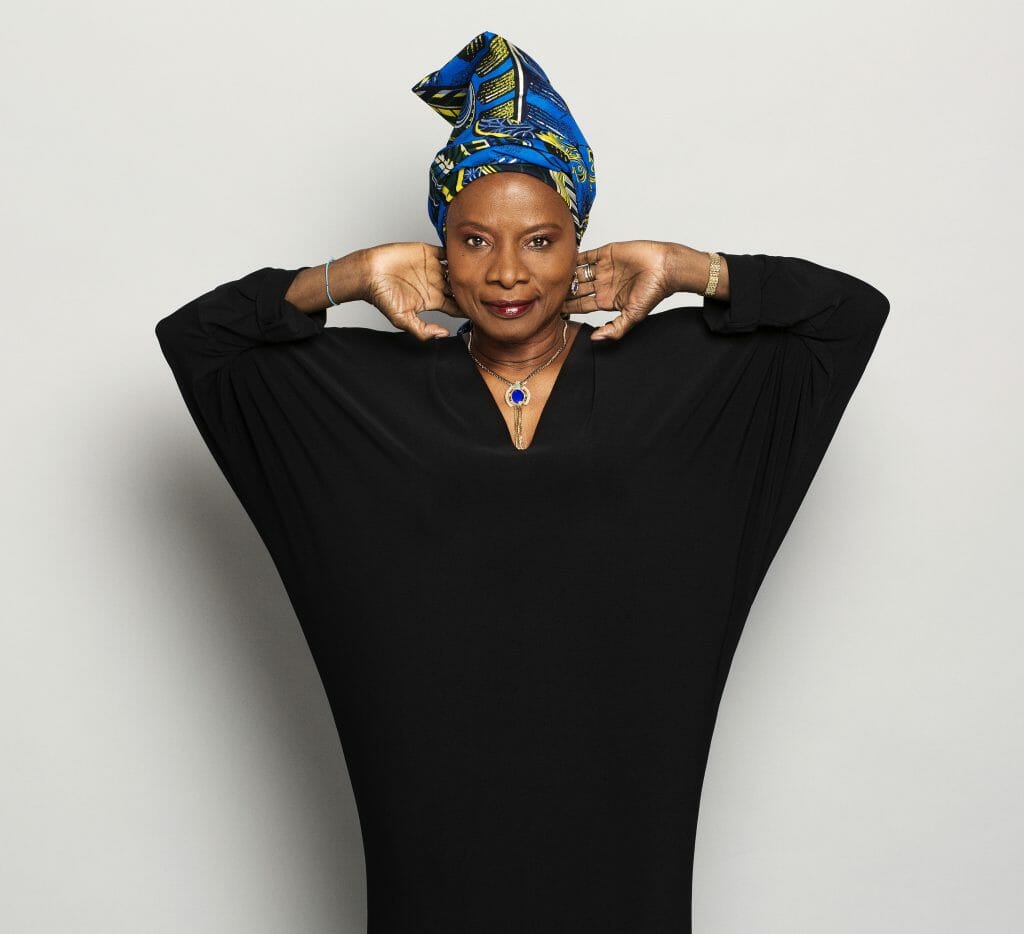Global Beat: Angélique Kidjo

photo credit: Fabrice Mabillot
***
“I’m in the Czech Republic, recording Philip Glass’ ‘12th Symphony,’” Angélique Kidjo says, when asked where she’s calling from. That might be surprising to some people, considering that the 61-year[1]old singer-songwriter and activist—originally from the West African nation of Benin— isn’t especially known for working within the minimalist contemporary classical realm. But Kidjo has built a career out of doing the unexpected. In 2019, she released the album Celia, her tribute to the late Cuban singer Celia Cruz, and the year before that, Kidjo reimagined Talking Heads’ Remain in Light in her own image. And, yes, she has worked with Glass before, setting her words—sung in the Yoruba language—to orchestrated music that he composed.
“I go by my intuition,” Kidjo says when asked how she decides what her next project should sound like. “If you ask me: ‘What are you going to do next?’ I’ll say, ‘If I know, what’s the point of living?’ If you know what tomorrow holds, what’s the surprise? I want to wake up and be surprised. I want to have this wonderful idea and go, ‘Wow!’ I don’t want to plan. That’s so boring.”
Certainly—as it did for everyone—the current pandemic took Kidjo by surprise, but she used the time to fashion her latest album, Mother Nature. “When the COVID lockdown arrived, I said, ‘Well, that won’t stop me! I’ll find a way to do it,’” Kidjo says. “If we can do Zoom, there’s a way to do music. Then, I started reaching out.” A mix of topical message songs and straight-up dance tracks, the finished collection features contributions from several young African singers, rappers and musicians. (“Dancing is also a message,” she makes a point to say.)
The first person Kidjo called to help out was Yemi Alade, a Nigerian singer-songwriter. Together, they cut the track “Dignity,” speaking out against corruption and brutality. “We all need to embrace dignity,” says Kidjo about the song. “We need to talk about respect and values. I sang [Alade] the song. And, within a week, it was done.”
Like so many recent recordings, Mother Nature was recorded remotely. Kidjo and her guests never met; her collaborators recorded their parts locally and, the singer says, “Pieces of songs would arrive from different parts of the world.”
As she explains: “I just had to push a button, and we could make a minimal carbon footprint album. It was really interesting, and exciting, but I missed being face to face with the people in the studio. That brings in another dynamic.”
Dynamic is a word that has been used more than a few times to describe Kidjo herself. Growing up in Benin, she listened to everything from the African greats like Hugh Masekela and Miriam Makeba to American artists Jimi Hendrix, Otis Redding and Carlos Santana. By the time she relocated to Paris in the early ‘80s, she was already performing professionally. (Today, she is a resident of Brooklyn.) From the start, she mixed elements of several genres seamlessly, singing her songs in five languages. She always had her eyes on a larger prize: making an impact globally.
“My father and mother always used to tell me to dream big,” Kidjo says. “‘If it’s not big enough, just shut up; we don’t want to hear about your petty dreams.’ And my father always said, ‘Talent has no sex, no gender. If you do something that makes you happy, that’s what you want to do—go for it. You will fall, but you’re going to stand up. That’s what life is. It’s human. It’s natural. If you do what makes you happy and it makes people happy on the entire planet, you’ve done what you’re here for.’”
Whether she is playing under a tent at Bonnaroo or appearing at Carnegie Hall— where she recently welcomed guests like Glass, Josh Groban and Cyndi Lauper—Kidjo is known to deliver a feisty performance. Often, she leaves the stage with a cordless microphone in order to work the crowd closely, high-fiving outstretched hands as she walks through the aisles. In that regard, the pandemic’s restrictions have truly cramped her style. Only recently has she begun performing live again. “I missed it so much,” she says.
Kidjo’s career as a prolific artist would be more than enough to exhaust most performers, but she has long maintained an equally hectic schedule as an activist. For nearly two decades, she has served as a UNICEF Goodwill Ambassador for the United Nations, involved with causes— most of them pertaining to African issues—ranging from climate change to women’s rights, vaccinating pregnant women and providing girls with an education. She has traveled all over Africa and to many other countries, both as a spokesperson and as a singer.
In doing so, Kidjo says, she is often flummoxed to find that some Westerners still harbor antiquated notions of what Africa is like—or what it even is. Some people, she says, don’t even realize that Africa is not a single country. “I’ve been into that conversation forever,” she says, frustration in her voice. “People always say, ‘Your country, Africa.’ I say, ‘Africa is a continent, dumbass! What’s wrong with you?’ Every time I’ve received a Grammy, I’ve said, ‘People, wake up! There is something else going on. Get off the clichés.’
“There are going to be good things and bad things, like anywhere else in the world,” she continues. “But if you don’t reach out to the young kids, you’re gonna miss out. Every time I go back to Africa, I’m really excited and blown away by the boldness and the entrepreneurship. The internet has allowed them to say to themselves: ‘We want to be free. We want to do our own music. We want to be our own kings and queens in our countries, in our continent.’ I like thinking forward.”




















